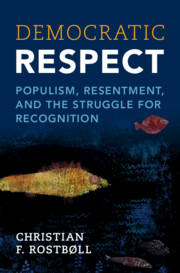Book contents
- Democratic Respect
- Democratic Respect
- Copyright page
- Dedication
- Contents
- Acknowledgments
- Introduction
- 1 Recognition and the Politics of Resentment
- 2 Respect, Esteem, and Solidarity
- 3 Rights and the Populist Claim for Recognition
- 4 Procedures, Outcomes, or Identification?
- 5 Respecting Disagreement
- 6 Publicity and Correcting Democracy
- Bibliography
- Index
6 - Publicity and Correcting Democracy
Published online by Cambridge University Press: 16 March 2023
- Democratic Respect
- Democratic Respect
- Copyright page
- Dedication
- Contents
- Acknowledgments
- Introduction
- 1 Recognition and the Politics of Resentment
- 2 Respect, Esteem, and Solidarity
- 3 Rights and the Populist Claim for Recognition
- 4 Procedures, Outcomes, or Identification?
- 5 Respecting Disagreement
- 6 Publicity and Correcting Democracy
- Bibliography
- Index
Summary
This chapter considers the possibility that even if populism is in tension with our best conceptions of democracy and respect, it could nevertheless correct the deficiencies of actually existing democracy. It asks whether it is permissible to promote populism, if this can correct some of the flaws that contemporary democracies truly have. Thus, the posed question is not whether populist parties can correct democracy, as this question might be understood by an external observer. Instead, the analysis proceeds from the participant attitude and asks whether we, or anyone, as fellow participants in democracy can endorse and promote populism because it has positive effects on a non-populist understanding of democracy. Applying the publicity condition first suggested by Kant and later expounded by Rawls, the contention is that we cannot. We cannot publicly both endorse populism and say we do so because it improves democracy understood in non-populist terms. The publicity condition rules out the possibility of promoting one set of ideas (populism) for the sake of another set of ideas (non-populist democracy). The argument for promoting populism for the sake of non-populist ends cannot be publicly communicated without frustrating those very ends.
Keywords
- Type
- Chapter
- Information
- Democratic RespectPopulism, Resentment, and the Struggle for Recognition, pp. 189 - 214Publisher: Cambridge University PressPrint publication year: 2023

